The key to becoming an effective student is learning to study smarter, not harder. As you advance in your education, this becomes even more important.
An hour or two of studying a day is usually sufficient to make it through high school with satisfactory grades. But when college arrives, without smart study habits, you can feel like there aren’t enough hours in a day to cover your coursework.
While some students breeze through school with minimal effort, the vast majority of students succeed because they deliberately develop and apply effective study habits.
The following are the top 10 study habits of highly effective students:
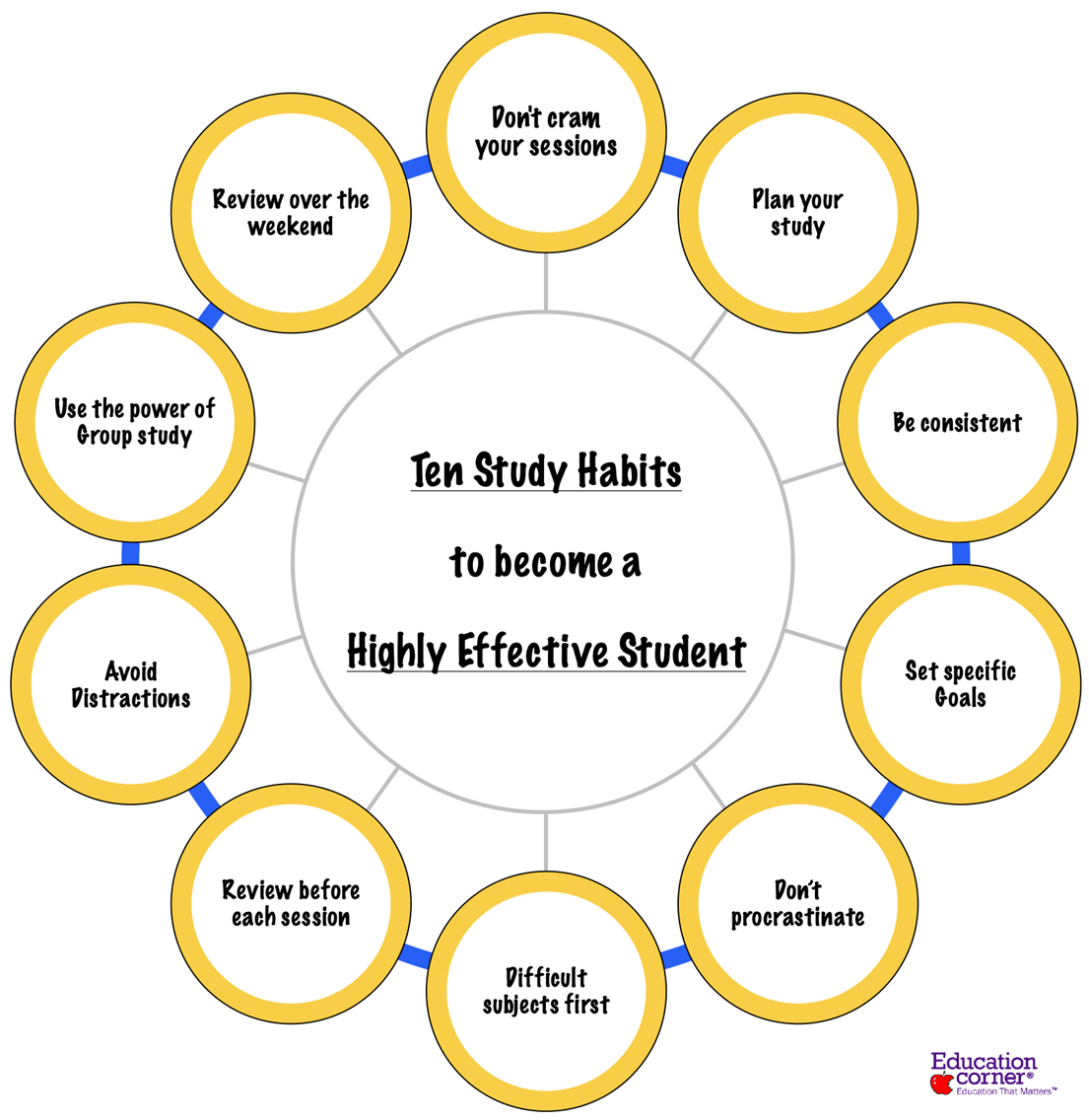
If you want to become a successful student, don’t get discouraged or give up. Work to develop each of these habits, and you’ll see your grades rise, your knowledge increase, and your ability to learn and assimilate information improve.
1. Don’t attempt to cram all your studying into one session
Are you ever up late at night spending more energy trying to keep your eyelids open than you are studying? If so, it’s time to change your approach.
Research shows that spacing out study sessions over longer periods improves long-term memory. In other words, if you have 4 hours to spend on a subject, it’s better to study it for one hour each for four days than to cram all 4 hours into one.
Likewise, cramming everything right before an exam may probably help you with grades, but it is horrible for your long-term memory retention. Without realizing it, you may be undercutting your learning in the long term.
Successful students typically space their work out over shorter periods and rarely try to cram all their study into just one or two sessions. If you want to become a successful student, you need to learn to be consistent in your studies and have regular, yet shorter, study periods.
2. Plan when you’re going to study
Successful students schedule specific study times throughout the week and stick to them, while those who do not perform as well typically study sporadically and whimsically.
A study schedule can help you plan, break your study load into manageable amounts, and ensure you don’t rush on assignments when following deadlines.
In short, a study plan helps you manage and achieve your learning goals better.
Even if you’re all caught up with your studies, creating a weekly routine, where you set aside some time every few days a week to review your courses, will ensure you develop habits that will enable you to succeed in your long-term education.
3. Study at the same time; be consistent
Not only is it important to plan when you’re going to study, but it’s also essential that you create a consistent, daily study routine.
The power of consistency is well understood in academics. It helps you rely a lot less on intensity – which means fewer late nights or all-nighters and fewer moments of overwhelm and panic, which is a positive for your mental health.
When you study at the same time every day, you develop a habit. You rely less on willpower. Motivation increases, and you’ll be mentally and emotionally prepared for each session. This will improve productivity.
Your schedule may require adjustments from time to time due to unexpected events, and that’s okay, but it is important to get back to your routine as soon as the event has passed.
Here are some strategies to stick to your routine:
- Prepare a timetable – even if your track record of sticking to timetables is poor, make one. Make it realistic and display it in your place of study. Timetables aid in better time management, which research has shown to have a direct positive impact on academic results.
- Exercise and meditate – To be consistent in your studies, your health, as well as your mind, must support you. Physical exercise helps you maintain good health and a fresh mind, while meditation helps reduce stress and anxiety.
- Reward yourself – If you follow your timetable, you deserve a reward. Go outside and enjoy some free time with your friends and family. And when you do it, don’t think about your studies. Rewarding yourself will motivate you to be consistent.
- Take breaks – Contrary to popular belief, taking breaks, if they are of the right kind, can increase productivity rather than decrease it. Avoid activities such as scrolling through social media or surfing the internet. Instead, take a short walk, have a healthy snack, or speak with your roommate.
4. Each study time should have a specific goal
Simply studying without direction is not effective. You need to know exactly what you need to accomplish during each study session.
If you observe, most adults around you – from those working in great companies to your favorite athletes and entrepreneurs will have written goals and objectives. Goals dictate their day-to-day activities and how they manage their time.
There is enough research evidence to show a positive correlation between goals and student outcomes. Hence, before you start studying, set a study session goal that supports your overall academic objectives. Here are some best practices:
- Set optimally challenging goals – your goals must be such that you must push yourself to achieve them, but at the same time, they must not be so hard that they demotivate you.
- Make your goals specific, measurable, and time-bound – a good example is “Memorize 30 Spanish vocabulary words in 60 minutes to ace the Spanish test.” It’s a good goal because it tells you what exactly to do, how to measure it, and by what time you must complete it.
A not-so-good example is “Study Spanish to ace the Spanish test” – this does not tell you what to focus on, the results can’t be properly measured, and you don’t know when to complete this task. - Set mastery goals – your goals must focus on deeply understanding concepts and skills. This will help you in your long-term learning journey that extends far beyond your exams and grades.
- Define goals positively – How you frame your goal can make a difference. If you word your goal such that it sounds more like a threat rather than a challenge, it may adversely impact your achievement.
For example, “I will complete at least 7 out of 10 tasks correctly” is a better goal than “I will not make more than 3 mistakes when attempting 10 tasks”
To understand why goals work, look at the below diagram:
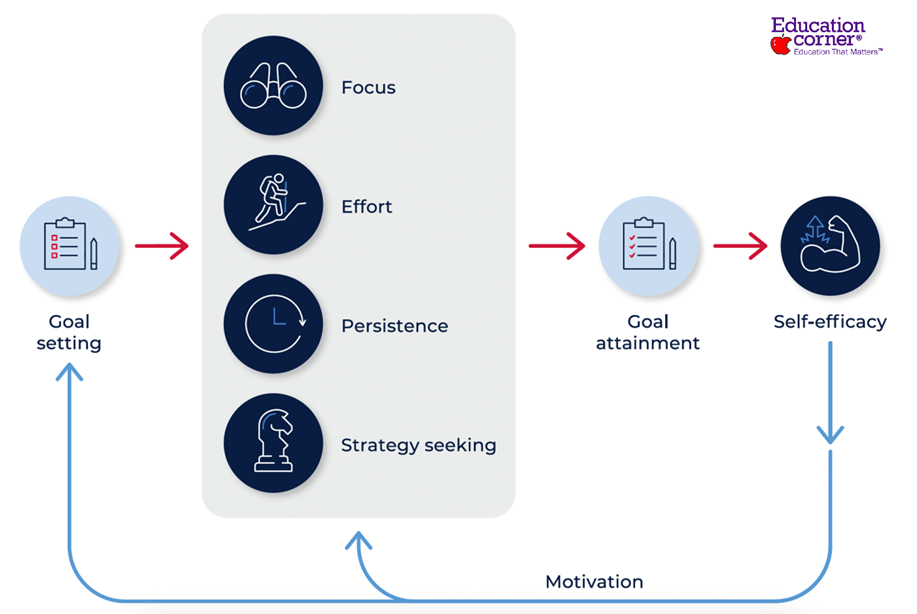
Setting goals clarifies what needs to be done. You know where to focus your attention and effort while avoiding distractions. This clarity encourages you to put in more effort and seek out or develop new strategies for success.
You apply what you know innovatively and learn new methods. Reaching your goal boosts your confidence in your abilities, enhances your motivation, and sets you up for further success.
5. Never procrastinate your planned study session
It’s very easy and common to put off your study session for several reasons – the subject may not be interesting, you may have other things to do, or it may be because the assignment is very hard.
Successful students DO NOT procrastinate when studying.
It is a tough habit to break, particularly when the Internet allows you to escape frustrations with the click of a mouse.
Procrastinating can have negative effects – your study will be much less effective, and you may not accomplish everything you need, which could lead to rushing at the last minute – the number one cause of errors.
It can also affect your mental health by increasing stress and anxiety:
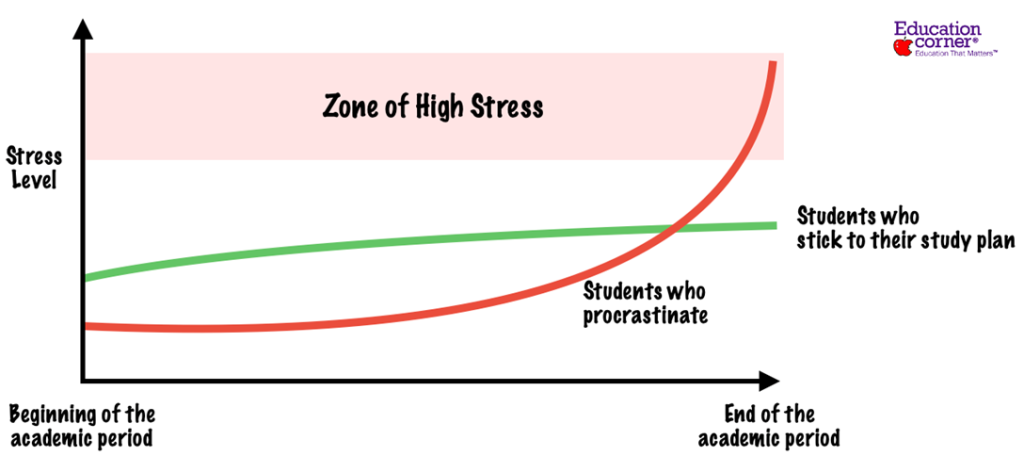
Procrastination can increase stress levels and affect a student’s mental health and well-being.
Procrastination results from the emotional part of your brain taking over the logical side. Your logical brain surrenders when you choose Facebook over work or decide to binge on another Netflix series.
Here is what you can do to give your logical brain the upper hand:
- Identify triggers: One of these seven triggers makes you procrastinate on a task:
 Pychyl’s seven procrastination triggers (Source: Harvard Business Review)
Pychyl’s seven procrastination triggers (Source: Harvard Business Review) - Reverse the trigger: Consider which of the seven triggers your study activity sets off. Then, try to think differently about the task – make the idea of completing it more attractive.
For example, if studying history through plain reading can be boring, you can make it interesting by drawing a timeline with important events and characters. - Work within your resistance level: Let’s say you have a complicated math problem to solve. To find your resistance level, consider the effort you commit to that task along a scale.
For example, could you focus on it for an hour? No, what about 30 minutes? Shorten the amount of time until you find a period with which you’re no longer resistant to the task, and then do it. - Do something, anything, to get started: tasks that induce procrastination are rarely as bad as we think. It’s easier to keep going once you have overcome the initial hump of starting it in the first place. Starting a task means you’ll continue to process it, making you more likely to resume the work later.
- List the costs of procrastination: remind yourself about what it would cost you to postpone something.
- Disconnect – Put your phone in another room or shut off the Wi-Fi. Cut down the distractions that can stop you from focusing on the task.
6. Start with the most difficult subject first
Your most difficult assignment or subject will require the most effort and mental energy; hence, you should start with it first.
Research has shown that when you are tired, your brain tries to save mental energy to help you make decisions quickly. It tags effort as bad (because it’s hard work), and you are likely to “go with your gut” instead of carefully considering all the available information.
When your focus is not at its best, studying hard subjects can be, well, hard!
But if you complete the most challenging part of your study in a fresh state of mind, completing the more accessible ones later becomes easier. This can significantly improve the effectiveness of your study sessions and your academic performance.
7. Always review your notes before starting an assignment
Research shows that 10 minutes of review for every lecture hour, done within 24 hours of class, dramatically improves recall. Hence, regularly reviewing class notes is one of the most powerful study strategies.
Obviously, before you can review your notes, you must first have notes to review. While there is no single right approach to note-taking, the following are some of the popular ones:
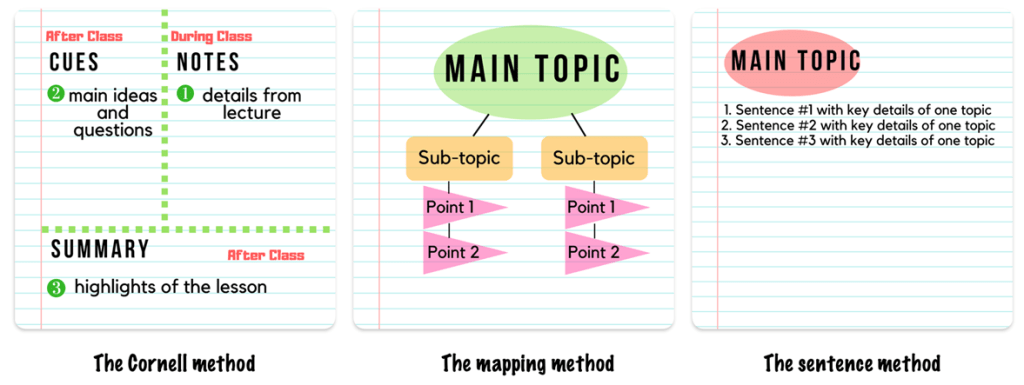
Cornell method
Split up your paper into three sections (see image). The first aspect requires you to write out notes during class as you hear them. Once class is over, you reread your “Notes” section and add any questions or essential ideas within the “Cues” section.
Once you have filled in these two sections, it is time to write a summary of the lesson that you can refer to study. You will have a stack of neatly organized notes from each lecture by exam time. Learn more about the The Cornell System for taking notes.
Mapping method
Allows a visual representation of your notes in a way that shows the relationships between ideas. Start by jotting down the lecture’s main idea and add subheadings throughout the class. By the end, you should have a main topic with many subheadings and additional notes beneath them.
Sentence method
It is a relatively simple method that requires a main topic followed by notes in sentence or point form. The heading creates some organization while at the same time allowing for freedom.
While these three are time-tested pen-and-paper methods, you can also use electronic devices for note-taking. Apps like Evernote, Microsoft OneNote, or Google Keep can help you stay organized with your note-taking.
Before you start each study session and a particular assignment, review your notes thoroughly to ensure you know how to complete the assignment correctly. This will help you remember important subject matter learned during the day and ensure your studying is targeted and effective.
Learn how to improve your note taking.
8. Make sure you’re not distracted while you’re studying
The negative outcomes of distracted learning have been well documented. It can prolong learning tasks due to the need for reacquaintance with material, induce mental fatigue from constant task-switching, and reduce long-term memory retention.
But everyone gets distracted by something. Maybe it’s the TV, or maybe it’s your family or the very many electronic gadgets that surround you. When you’re distracted, you lose your train of thought and cannot focus, leading to ineffective studying.
Some students cannot study when it’s too quiet. Research has shown that some people study better with a bit of background noise.
You must experiment and identify what surroundings suit you best. Whether it is a quiet cubicle in the recesses of the library or a common area with a bit of background noise, find a place where you won’t be disturbed or distracted.
9. Use study groups effectively
Study groups can help you externalize your thoughts, address procrastination, stimulate study sessions, and maintain accountability. They can be an effective part of your comprehensive study plan.
Working in groups enables you to get help from others when struggling, complete assignments more quickly, and teach others, which is a great way to internalize the subject.
Here are some best practices for forming effective study groups:
- Limit the group size – in larger groups, it becomes increasingly difficult to keep everyone involved. Typically, 3-5 students can ensure a good functional dynamic.
- Have a structure – define the goals for every session and stick to them.
- Come prepared – it is much easier as a group to help each other if each member comes to the session with a list of questions or topics to discuss.
- Empower each other – Don’t hesitate to help your fellow classmates. Tutor-tutee relationships are mutually beneficial. Help someone else, and they will help you!
- Quiz each other – Quizzing each other on facts and concepts is a valuable way to prepare for an exam. This could also mean designing practice tests together.
- Work independently but together – if you work hard on your own before meeting as a group, your group time will be more rewarding. Groups are your place to experiment, seek help, and share your learning. However, you must develop an independent grasp of concepts to do well in a course.
- Form friendships – connections can leave you feeling more motivated than ever, making studying enjoyable.
It is also helpful to designate one of the members to facilitate the group. This person will be responsible for scheduling, tracking group progress, and helping the group stay focused. A good way to do this is by designating a “leader of the week” on a rotation basis.
Study groups are not just about meeting right before an exam. To achieve great results, you must meet regularly throughout the semester. Online tools such as Zoom, Teams, and Slack are great ways to connect when you cannot meet in person.
10. Review your notes, schoolwork, and other class materials over the weekend
Successful students review what they’ve learned during the week over the weekend. Research shows that academic success is positively correlated with weekend study time.
But remember, the weekend is just 48 hours, and time flies quickly. So, reflect on your goals and prepare ahead. Here are some tips:
- Use Friday after school to plan your weekend.
- Keep a journal – record how you spend your time and where you can improve.
- Look at it as a time to practice for “real life” – you are totally in charge of your time.
- Balance your sleep and energy.
- Budget time for sports and other activities – keep twice the time you think you’ll need.
- Get ahead of others – wake up early (most don’t). Mornings are a good time to study.
A well-spent weekend can prepare you to continue learning new concepts that build upon previous coursework and knowledge acquired the previous week.
In summary, you can learn the “10 study habits of highly effective students” and consciously apply them to improve the effectiveness of your study. We’re confident that if you develop these habits, you’ll see a significant improvement in your academics.


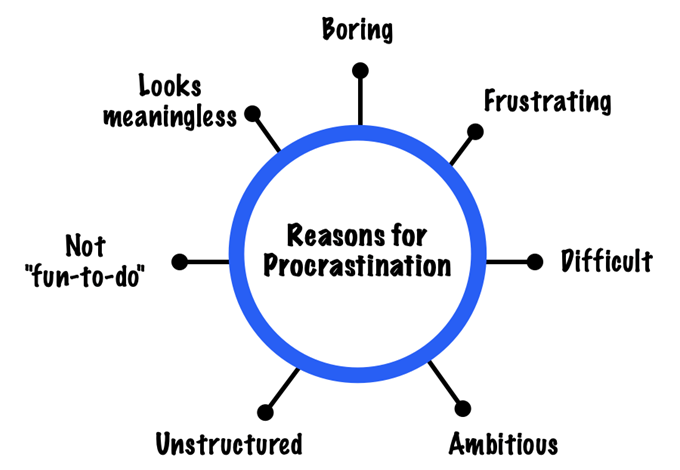 Pychyl’s seven procrastination triggers (
Pychyl’s seven procrastination triggers (